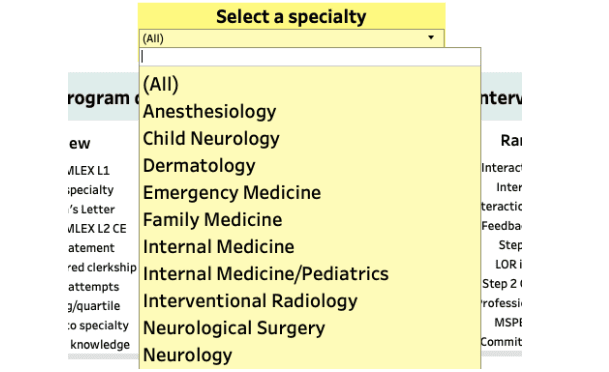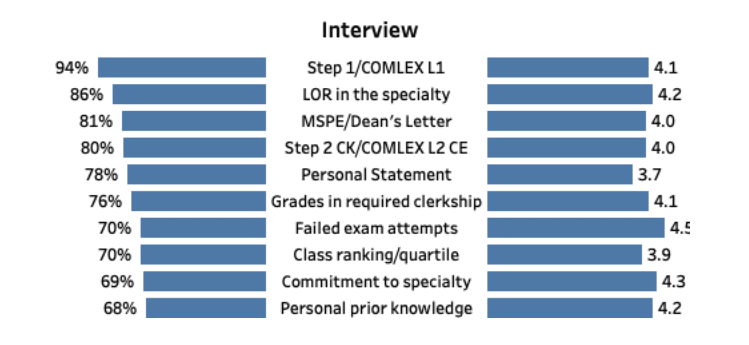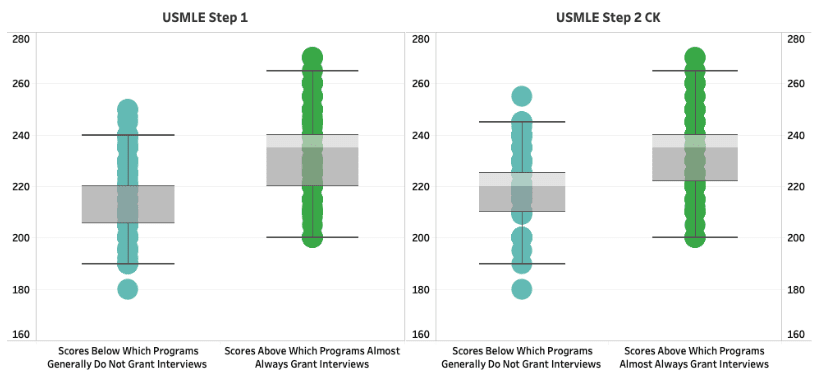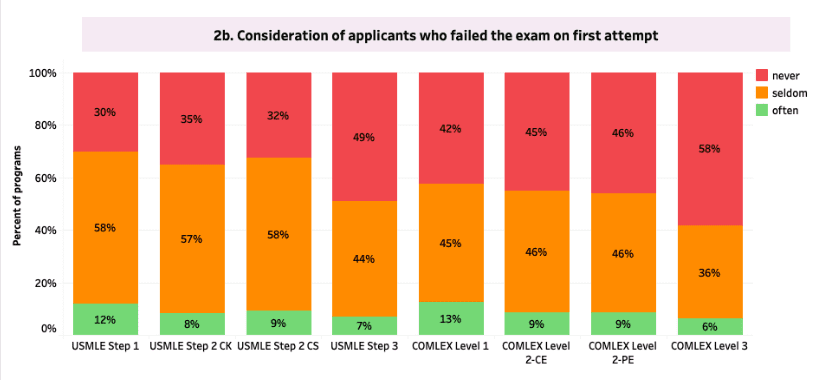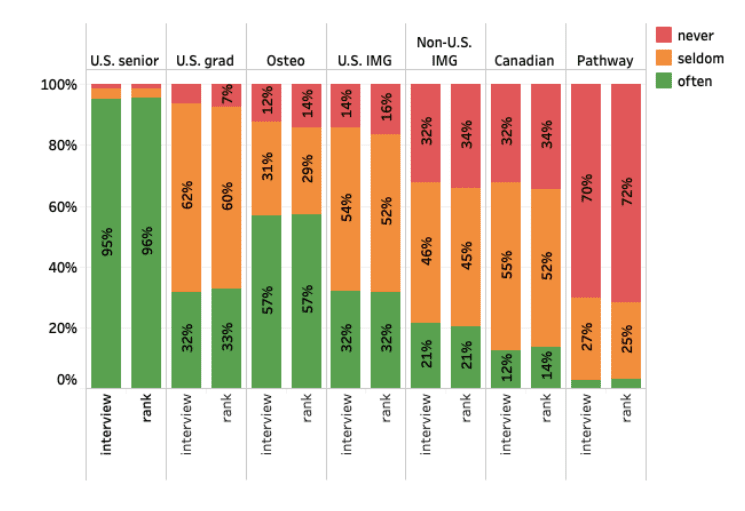Will I Match into My Residency Specialty of Choice?

4496 Views
How to Match for a Specific Residency?
The NRMP Program directors survey “at a glance” tool is extremely helpful in gauging where your application packet stands compared to the applicant pool, and whether adding additional components, like a letter of recommendation (LOR) in the specialty or more focus on your personal statement, could give you a leg up as programs review your application.
You should be aware however, that only 30% of all programs responded to the survey, and thus should be taken as a directional sample, and not the absolute dogma of Program thinking or a designated tool to predict applicant success or failure in the match. It is however, a nice gut check for how competitive your application is for your chosen specialty.
The survey seems to encompass most specialties (23 in total) and transitional year, though we note Urology is missing as it has its own match process outside of the NRMP.
The interactive tableau tool can be found here, and we recommend taking a look at the specialty you’ll be applying to before submitting your ERAS packet: https://public.tableau.com/profile/national.resident.matching.program#!/vizhome/PDSurvey_0/Desktoptablet
When you open the survey, the displayed data include “ALL” specialties. Choose from the drop-down menu to select the specialty you want to view.
What’s in the NRMP survey?:
- “Top 10” factors PDs in that specialty use to select applicants for interview/ranking. The important is ranked from 1 to 5 (displayed on the left) and percent who listed the item in their top 10 (displayed to the right)
- USMLE/COMLEX Score Requirements: This table lists whether programs require passing, or a “target score” for board exams. It is only really useful to determine whether most programs require Step 2 or 3 as almost all specialties will have a “target” screen for Step 1.
- Target USMLE/COMLEX Scores: Step 1/2 and COMLEX data are presented in box-and-whisker plots. Two plots are displayed: (1) scores below which programs generally do not grant interviews (left plot in blue) and (2) scores above which programs almost always grant interviews (right plot in green). The middle section of each plot between the upper and lower “hinges” (the interquartile range, or IQR) is called the “box,” and the lines extending parallel from the boxes are known as the “whiskers.” Whiskers are 1.5 times the IQR away from the “hinges.” Data outside upper and lower whiskers are outliers.
- Exam Failure: Shows the percentage of PDs in the specialty who “Never”, “Seldom” or “Often” consider applicants who failed an exam on the first attempt
- Positions, Applications, Interviews, and Ranks: This shows how many positions exist in the specialty and how many applicants typically apply per program, get an interviews, and are ranked. This information can help you compare how competitive your specialty may be to others.
- Interview Schedules: This shows when you can expect to receive and conduct interviews for your specialty. This is very helpful in understanding when it’s getting “late” in the interview offer season and time to reach out to programs of high interest you have not heard from.
- Resident Success: This is a list of factors PDs use to gauge resident success, and it not particularly useful for the application process.
Major residency application components of the NRMP survey you should pay attention to are (from top to bottom of the interactive webpage):
- Top 10 factors PDs use for Interview Selection: This is likely THE most useful table of ALL. Pay attention to the top 3-4 elements:
- Are there any of these you have control over now? – Like a LOR in the specialty or highlighting your research, or focusing more on your personal statement? If so, take advantage and spend some Extra time in ERAS to ensure you have these as major features your application packet!
- Go back through the body of the ERAS application and ensure the right elements are clearly highlighted (i.e. research, experience in the specialty, key people/attendings you worked with, etc.)
- Step 1 Score
- Scores which programs Almost Always grant interviews: Ideally you want to be at or above the lower hinge (bottom of grey box) for the “scores which programs always grant interviews) graph, or At Least above the range where programs generally do NOT offer interviews.
- Scores which programs Generally Don’t grant interviews: If you’re within the grey box or below here, you should apply very broadly in the specialty AND have a back-up specialty with lower Test scores.
- If you’re within the upper whisker of the do NOT grant/lower whisker of the Almost Always grant, simply apply broadly in the specialty. You may only need a back-up specialty if your primary specialty is highly competitive.
- If you’re above the range where most programs always offer interviews, you can likely be selective about where you apply.
- Step 2 –SHOULD you take it? Most programs now require at least passing CK, and we expect this number to continue to grow. So please make sure you will have your Step 2 score in by Early October at the latest.
- Step 2 Score: Treat Step 2 as a “minimum threshold” since Step 2 is generally looked at secondarily to Step 1. Be above the grey box range at which programs generally don’t grant interviews, and you should be ok.
- If you’re solid on Step 1 but low on Step 2, or low on Step 1, but high on Step 2, we recommend applying VERY broadly within the specialty.
- If you’re borderline or low on both exams, apply broadly, but also have a back-up specialty in play.
- Step 2 Score: Treat Step 2 as a “minimum threshold” since Step 2 is generally looked at secondarily to Step 1. Be above the grey box range at which programs generally don’t grant interviews, and you should be ok.
- Failing Step 1 – How big of a deal is it?: While Failing step 1 is a BIG deal in ANY specialty, some specialties may be more likely to consider you than others. So, if you’ve failed an exam, make sure at least 50% of programs will seldom still consider you. Any less, and you need to have a back-up specialty in mind.
- Are International Grads a GO?: Unless you’re a very strong IMG applicant, we suggest that your specialty have at least a 25% rate of often considering IMGs before also having a back-up specialty in play. IMGs MUST do their research and ensure you apply to programs that DO have active IMG residents.
- Do Interviewees Get Ranked?: If you’re highly likely (>90%) to end up on the rank list if you interview, then we feel fairly confident about interviewing with and ranking about 15 programs to feel comfortable about successfully matching. Once you’ve got 15 interview invitations, you can feel okay with starting to prioritize and cancel less desirable interviews.
- Expect interview invitations from late Sept to Nov: If you’re falling short of 10-15 interviews by Thanksgiving, start reaching out to programs you are REALLY interested in to express interest in interviewing to beef up your rank list.
- The bottom graph on Factors in assessing resident success is not particularly useful, and you can ignore this.
Browse your specialty carefully! Understand where you can beef up for application packet – a LOR from the specialty, or by highlighting research experiences within the experience section of ERAS, or by putting extra effort into your personal statement!
After you study how you stack up versus your specialty, take a look at a few other specialties and note what’s NOT as important for your specialty (but may be for others):
- Research, AOA, LOR in the specialty, Personal connection…. these are just some of the aspects that seem to be more specialty specific that may or may not be important for the strength of your application
- Knowing what’s important vs. not important can help you revise your personal statement and the experiences you highlight in your ERAS experience section
Residency Matching Summary:
- Get the full picture on what would make a solid application in your specialty.
- Do you have a Step 1/2 score above the range where programs generally don’t offer interviews?
- What additional aspects are important for your specialty: LOR, Personal statement, Research experiences – Be sure to spend time highlighting/refining these in ERAS.
- If you’re an IMG or failed an exam – be sure programs will still consider you. If there’s lower interest, have a back-up specialty in play.
- Expect Interviews Late Sept-Nov. Reach out to programs you have high interest in if you haven’t heard from them by thanksgiving. Once you have about 15 interview invitations, you can start being picky about which ones you actually take (but not before).
For further discussion on how to prep for your interview see our blog post on How to Crush your Residency Interview.
Good Luck!
Featured Articles



